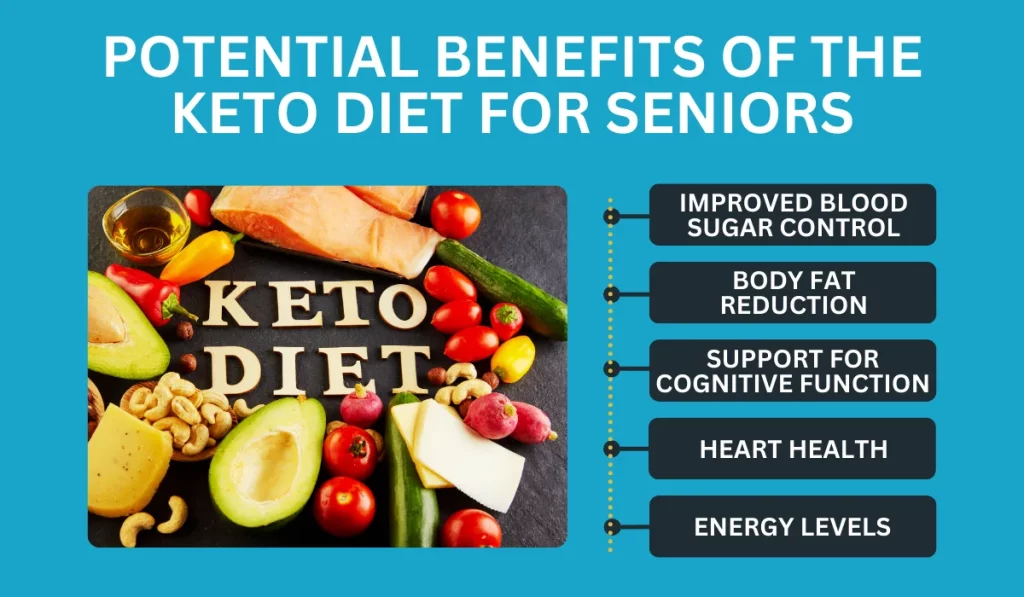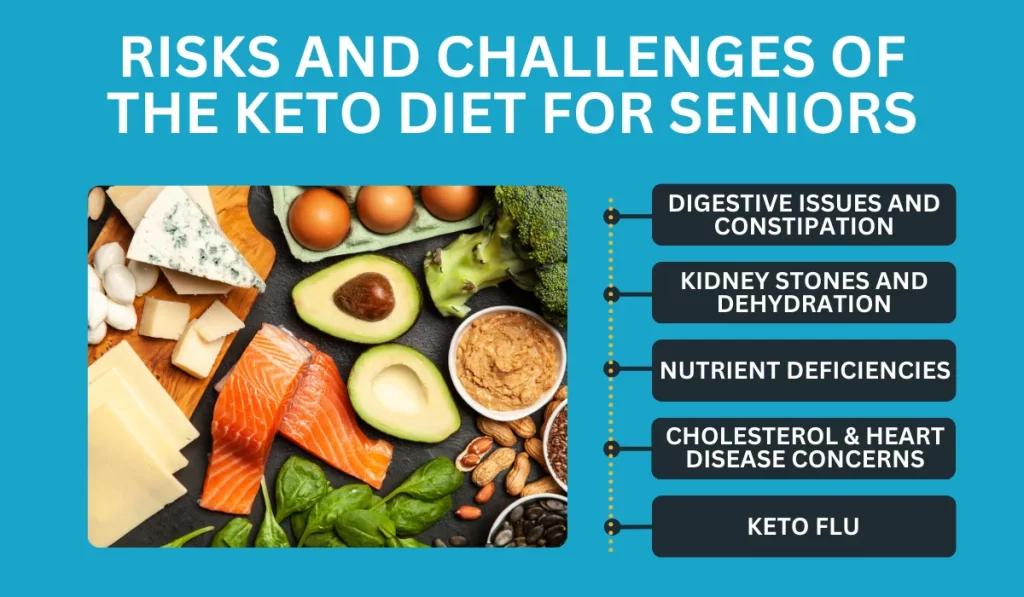Is the Keto Diet Safe for Seniors?

Table of Contents
The keto diet has become increasingly popular for its potential health benefits, especially among those seeking weight loss or improved blood sugar control. For seniors, this high-fat, low-carb diet offers intriguing possibilities but also presents unique risks.
In this article, we’ll dive into the potential benefits, safety considerations, and practical tips for older adults exploring the ketogenic diet.
Key Takeaways
- The keto diet is a low-carb, high-fat eating plan that helps the body burn fat for energy.
- Seniors may see benefits like steady energy, better blood sugar control, weight loss, and support for brain health.
- Challenges like digestive issues, dehydration, nutrient gaps, and cholesterol changes make careful planning important for seniors on keto.
- Talking to a doctor, staying hydrated, and balancing nutrients are key to making the diet safe and effective.
Is the Keto Diet Right for You?
The ketogenic diet is a low-carbohydrate eating plan designed to induce a metabolic state called ketosis, where the body shifts from using glucose as its primary energy source to burning fat. This metabolic process generates ketones, which can fuel the brain and body.
Typical foods on a keto diet for seniors include:
- Avocados and olive oil for healthy fats
- Fatty fish like salmon and mackerel for omega-3s
- Leafy greens for essential nutrients
- Small portions of moderate-protein foods like chicken and eggs
Foods to avoid include starchy vegetables, bread, and sugar-laden snacks.
The keto diet may work for some seniors, but it’s not a one-size-fits-all solution. Here are some tips to decide if it’s the right approach:
Work with a Healthcare Provider
Always consult a healthcare professional or dietitian before making significant dietary changes, especially if you have medical conditions like diabetes or cardiovascular issues.
Monitor Blood Sugar and Blood Pressure
If you’re taking medications for diabetes or hypertension, regular monitoring is crucial to ensure the diet doesn’t cause unwanted side effects like low blood sugar or drastically reduced blood pressure.
Stay Hydrated
Dehydration can happen quickly on the keto diet because the body loses more water during the state of ketosis. Drink plenty of water daily, and include electrolyte-rich foods like avocados or supplements to stay balanced.
Be Mindful of Muscle Mass
Keeping muscle mass is essential for mobility and strength. Include moderate-protein foods like eggs and fatty fish to support muscles while sticking to the diet’s guidelines.
Potential Benefits of the Keto Diet for Seniors

If you’re thinking about trying the keto diet, you might be wondering what’s in it for you. The truth is, this eating plan may offer more than just weight loss.
Let’s take a closer look at some of its potential health benefits:
- Improved Blood Sugar Control: Seniors with type 2 diabetes may find the keto diet helpful in managing blood sugar levels. By reducing carbohydrates, the diet lowers the need for insulin and can stabilize glucose fluctuations.
- Body Fat Reduction: A low-carbohydrate eating plan like the keto diet encourages the body to burn body fat for energy.
- Support for Cognitive Function: Research has linked the ketogenic diet to potential benefits for cognitive decline. Ketones may serve as an efficient fuel source for the brain, offering hope for conditions like Alzheimer’s disease.
- Heart Health: Emphasizing healthy fats like coconut oil and olive oil while minimizing processed foods can support cardiovascular health by reducing inflammation.
- Energy Levels: Many older adults report steadier energy levels on a keto diet, as ketones provide a consistent source of fuel without the spikes and crashes associated with high-carb diets.
Risks and Challenges of the Keto Diet for Seniors

While the keto diet offers potential benefits, it’s not without risks, especially for seniors. Here are the key concerns to keep in mind:
- Digestive Issues and Constipation: The keto diet can sometimes lead to digestive issues, particularly constipation, due to reduced fiber intake from starchy vegetables and whole grains.
- Kidney Stones and Dehydration: Higher protein intake on the keto diet may increase the risk of kidney stones, particularly in those with pre-existing kidney conditions.
- Nutrient Deficiencies: Avoiding certain food groups can lead to a lack of essential nutrients, such as calcium, magnesium, and potassium.
- Cholesterol and Heart Disease Concerns: While this high-fat diet encourages healthy fats, overconsumption of saturated fats can elevate cholesterol levels, potentially raising the risk of heart disease.
- Keto Flu: Some seniors may experience the keto flu during the initial transition into ketosis. Symptoms include elderly fatigue, headaches, and muscle cramps, but they typically resolve within a week.
Supporting Your Wellness Journey Beyond Diet
At California Mobility, we’re committed to supporting seniors in living healthy, independent lives. From stair lifts and home elevators to ramps and other accessibility products, our offerings are designed to help you move safely and comfortably in your home—because wellness is about more than diet.
Ready to take the next step toward safer, more independent living? Contact us today for a free consultation.
Together, we can create an environment that supports your health and mobility goals.
| This article is not a substitute for professional medical advice. Please be sure to consult a doctor before making any significant changes to your diet. |








